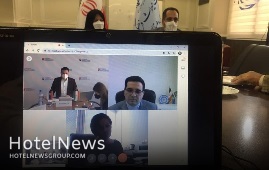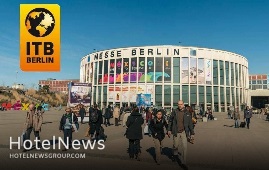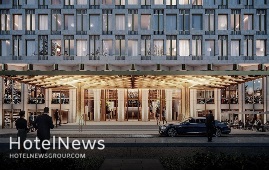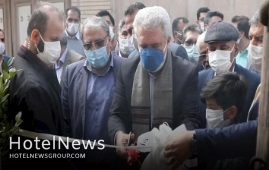
Head of the Iranian Tour Operators Association Ebrahim Pourfaraj has asked the government to issue tourist visas for the international applicants who have been fully vaccinated against COVID-19. “The Ministry of Health and the National Headquarters for Coronavirus Control can at least agree that the international tourists who have received the [second dose of] coronavirus vaccine would be allowed to enter Iran,” Pourfaraj said. He also lamented that the continuation of such a trend would result in losing international tourist markets more than before. “Or at least they should make it clear so that we can respond appropriately to foreign companies and tourists to not to miss the international tourist markets more than before.” Earlier this month, he said that the reasonable prices of Iran tours are expected to bring back the boom into the tourism sector of the country in the post coronavirus era. “Attractive tour plans are also being prepared for those who are eager to explore the historical attractions and natural wonders of the ancient country and want to experience a vacation here,” Pourfaraj said. He also expressed hope that international tour operators and companies who have worked with their Iranian counterparts for years, would put Iran back on the world’s travel route again, considering the facilities they can get at cheaper prices than in other countries. Referring to health tourism as a popular branch in Iran, he noted that medical services in Iran are provided at a lower price than what may be offered at double the price in other countries. Back in January, he announced that the tourist flow from across the world to Iran will return to normal in 2022. Although there are requests for traveling to Iran in the current year (2021), most travel agencies and tour operators believe that the flow will go back to normal in the next year, he explained. “Beginning mass vaccination against the coronavirus will provide better and safe conditions for international travels in 2022.” Last November, the World Tourism Organization announced that international tourist arrivals to Iran plunged 72% during the first eight months of 2020 when compared to 2019, highlighting the severe impact of COVID-19 as the main factor. Cultural Heritage, Tourism, and Handicrafts Minister Ali-Asghar Mounesan in October warned that Iran’s cultural heritage and tourism will be in a critical situation if the crises caused by the outbreak of the coronavirus continue. Last August, Mounesan said that Iran’s tourism has suffered a loss of 12 trillion rials (some $2.85 billion) since the outbreak of the coronavirus pandemic. Furthermore, the minister also noted that the coronavirus pandemic should not bring traveling to a complete standstill. “Corona is a fact, but can the virus stop tourism? Certainly not. For us, the coronavirus is a new experience in dealing with crises that teaches tourism experts around the world how to deal with such a disaster, and thankfully governments are turning this into an opportunity for better planning.” Smart and responsible traveling should replace "do not travel” recommendations, the minister stressed, adding: “In our country, Corona has caused problems in the tourism industry and the worrying point is the continuation of this trend.” “We are well aware of what the National Headquarters for Coronavirus Control proclaims [the health protocols], hence as a proposal, we have formulated some smart, responsible travel packages by the implementation of which we could have secure travels,” the minister said. He has repeatedly announced that his ministry is in full coordination with the Ministry of Health for strictly implementing health protocols in travel destinations, hospitably centers, and museums, amongst others, underlining that “people’s health is our priority.” The ancient land embraces hundreds of historical sites such as bazaars, museums, mosques, bridges, bathhouses, madrasas, mausoleums, churches, towers, and mansions, of which 24 being inscribed on the UNESCO World Heritage list. Under the 2025 Tourism Vision Plan, the country aims to increase the number of tourist arrivals from 4.8 million in 2014 to 20 million in 2025.
Create: Mar 16, 2021 Edit: Mar 16, 2021 Regional News
Renaissance Dallas Addison Hotel announces the completion of its top-to-bottom renovation that includes a total transformation of guest rooms, fitness center, and public spaces, as well as a redesign and upgrade of its more than 100,000 square feet of meeting and event spaces. Associate and guest safety continues to remain paramount during the pandemic with current guidelines located here. Owned and managed by Columbia Sussex, the Renaissance Dallas Addison is extremely popular for groups of all sizes and leisure travelers to North Dallas. Offering the biggest meeting space of any hotel in Addison, the hotel is located in the heart of the vibrant Addison “Restaurant Row” – just steps away from a wide variety of restaurants, nightlife entertainment and upscale shopping destinations, as well as key venues such as Addison Circle Park and Galleria Dallas. The hotel’s comprehensive renovations touched nearly every space within the property and, in keeping with the Renaissance brand’s ethos, were designed to reflect the spirit of the neighborhood, where visitors can enjoy culture, work and play. The area’s growing community of theatre, fine art, music and food invites travelers to immerse themselves in the vibrancy of the area, and the renovations reflect these ideals through neutral color palettes that juxtapose natural wood and leather materials with contemporary designs and thoughtfully-curated artistic focal points. The Renaissance Dallas Addison has implemented a number of health protocols and safety measures to allow people to feel comfortable traveling again when ready, including the option for an entirely contactless stay, social events designed to allow for social distancing, restrictions on fitness center capacity, housekeeping access to guest rooms, and thorough cleaning and sanitation protocols throughout the property that follow Marriott International’s Commitment to Clean protocols. The renovations at Renaissance Dallas Addison included: Meeting & Event Spaces Renaissance Dallas Addison’s expansive meeting and event space – totaling more than 100,000 square feet – attracts groups of all sizes to Addison and, with the biggest meeting space of any hotel in Addison, has consistently been among the city’s most popular meeting destinations. The hotel utilizes the Social Tables virtual platform to create event layouts that enable appropriate social distancing between guests and has remained a popular destination for social events during the pandemic as its space is able to accommodate up to 700 guests with proper social distancing protocols in place. This capacity will grow to 2,000 guests as restrictions are lifted. The redesigned meeting and event spaces offer state-of-the-art conference space, stylish meeting rooms, and indoor and outdoor event venues. The hotel features 37 flexible spaces from boardrooms to ballrooms, with the largest venue offering more than 25,000 square feet. Some highlights of the newly-introduced meeting offerings include: A neutral aesthetic replete with earth tones and natural fabrics reflecting the rich natural landscape and historic industries of oil and cattle that have shaped Addison Custom and innovative menus to inspire guests of all tastes and preferences – from coffee breaks and luncheons to cocktail banquets and seated receptions Anticipatory service aligned with the Renaissance brand, which intends to provide each guest with a unique and delightful experience State-of-the-art audio/visual capabilities to ensure seamless and enriching experiences for all meeting and event guests. Floorplans of the hotel meeting and event spaces are available here. Guest Rooms All 528 guest rooms, including 24 bi-level suites, ranging in size from 750 square feet to 2,400 square feet have been renovated to reflect the new design philosophy using wood, earthy tones and natural materials, coupled with a modern and upscale twist reflecting the Renaissance brand’s comfortable, modern aesthetic. The complete redesign of the hotel’s guest rooms included the appointment of entirely new furniture and furnishings, as well as upgrades to the HVAC system and plumbing. Updates to the guest rooms include thoughtful touches and elements reflective of the Dallas culture, such as the placement in each room of both a photograph of the “Blueprints” sculpture situated just behind the hotel in the Addison Circle Park and a portrait of Dallas-born musician Stevie Ray Vaughan. Additionally, each luxurious guest room is designed for optimal rest and productivity with architectural framing, contrasting finishes and wall cladding, upscale bathroom fixtures, and thoughtful solutions to enhance a guest’s stay, such as: Convenient wall outlets, lamp outlets and nightstands outfitted with USB ports for multiple electronic deviceLuxurious bedding with cotton-rich linens and fluffy pillowsHigh-speed Wi-Fi and a large desk with a well-lit workspace, comfortable chair and plug-in panels55-inch flat-panel TVs with the Marriott Entertainment Package, including premium cable and movie channels to keep guests well-entertainedIn-room refrigerator and coffee barStrategically placed mirrors, including back-lit vanity mirror and full-length mirrorsEclectic art collections featuring subjects local to Dallas. Public Spaces and Fitness Center Upon entering the Renaissance Dallas Addison, guests are immediately greeted by a fully renovated lobby. In its complete transformation, the lobby area was outfitted with new furniture, appealing light fixtures and a Discovery Table that are designed to invite guests into the public spaces with a sense of warm Southern hospitality. The new lobby also features artwork from local Dallas artists, including sculptures from Brad Oldam, and a unique interactive wall that offers a unique Texas belt buckle match game. With views leading into the newly redesigned lobby and downstairs public spaces, on-site restaurant Noell JCT will continue to offer contemporary, American-style cuisine made from fresh, locally-sourced ingredients. The adjacent Noell JCT Lounge has been updated with the addition of intimate, semi-private spaces perfect for small groups to conduct business or to unwind and enjoy an appetizer and a selection from the extensive wine list or cocktail menu. Additionally, the hotel’s on-site state-of-the-art fitness center has been transformed entirely with a larger footprint of more than 4,000 square feet and new Matrix Fitness equipment, including treadmills, stationary bikes, various weight stations and free weights.
Create: Mar 13, 2021 Edit: Mar 13, 2021 International News
As you are well aware, medical tourism is booming worldwide as about 20 to 24 million people are traveling for medical treatments annually. Factors such as increased care needs over longer lifespans, rising healthcare costs, and constant pressures on some insurance industries are reasons behind why some opt to travel abroad. Regarding price competitiveness, Iran currently ranks first in the world but the country has not been very successful in attracting potential travelers as other competitors like Singapore and Turkey. People from the Persian Gulf littoral states, Iraq and Syria as well as Iranian expatriates residing in Canada and Germany constituted the majority of medical travelers to the Islamic Republic, who received plastic, cosmetics, open-heart, and orthopedic surgeries amongst other treatments over the past couple of years. A recent study co-authored by Iranian researchers Khalil Momeni, Ali Jannati, Rahim Khodayari-Zarnaq, Shabnam Ghasemyani, and Mohamadreza Havasian, suggests the main difference between Iran other countries they selected for the study lies in the organizational structure of the main stakeholders of the tourism industry; in other countries, this industry is organized and supervised by specific coordination bodies. Data were gathered from databases, including PubMed, Web of Knowledge, Scopus, Magiran, SID, and websites of the World Tourism Association, the Ministry of Tourism, and the Ministry of Health of the selected countries from 2000 to 2020. The study was published in the Melbourne-based Healthscope, which operates private hospitals, medical centers, and international pathology services. Six countries were selected purposefully, including Singapore, Turkey, Costa Rica, Jordan, United Arab Emirates, and Iran. They were compared in terms of the status of tourism and travel competitiveness, governance and policy-making status, the status of the medical tourism industry, and medical tourism infrastructure. In terms of tourism and travel competitiveness, Singapore, with a global rank of 17, was better than other countries. Based on the status of the medical tourism industry, Costa Rica ranked 7th in the world, and Singapore, the UAE (Dubai), Turkey, UAE (Abu Dhabi), Jordan, and Iran ranked 15, 22, 27, 31 35, and 41, respectively. In Iran, all indicators of medical tourism infrastructure were lower than those of other countries except for competitive prices. Comparative tables involved components, such as general profile, tourism and travel competitiveness, governance and policy, the status of the medical tourism industry, and medical tourism infrastructure in selected countries. The framework analysis based on the identified components was used to analyze the data. Furthermore, the study has confirmed that despite the legal framework for medical tourism development in Iran, this industry is currently facing several challenges. “These challenges are lack of specific medical tourism structure at the international, national, and regional levels, the lack of a medical tourism system, definition and formulation of laws, policies, and plans, the lack of infrastructure, and the lack of supervision system.” All of the indicators in tourism and travel competitiveness are low in Iran except pricing, which is ranked as the first cheapest country in the world. The growing medical tourism industry requires the optimal provision of all tourism infrastructures and not only the promotion of different indicators, the study suggests. Based on the report of the Medical Tourism Organization, the UAE, Turkey, and Jordan are the three most important destinations for medical tourism in West Asia. Even though Iran has good conditions in terms of competitive price, presence of skilled physicians, and low waiting time among the studied countries, but other medical tourism infrastructures are not enough invested. For example, until 2017, Iran has not been able to obtain a JCI license even for one hospital, and the average per capita physician/nurse index is much lower than the global one. To promote medical tourism, it is necessary to recognize the strategic medical tourism status of each province in the country, supply a specialized workforce, provide high-quality services, improve infrastructure, and promote a positive attitude of authorities to support the medical tourism industry. The study has also found that factors that can play a positive role in the development of medical tourism in Iran are advanced services for infertility treatment, cosmetic and dental surgery, organ transplantation and cell therapy, cultural similarity and familiarity with neighboring countries, and competitive prices. Measures, such as improving human resource communication skills and developing private hospitals following international standards, can also be effective in developing medical tourism. The main difference between the selected countries and Iran lies down in the organizational structure of the main stakeholders of the tourism industry. The study showed that one of the challenges for growing medical tourism in Iran is the presence of different organs of political and decision-making, as well as the cultural and political conditions. In all other countries, this industry is organized and supervised by specific coordination bodies. The revise of coordinating policies and strategies between various ministries, other government bodies, the private sector could help facilitate cross-sectoral coordination in this area. One of the important factors in the development of the medical tourism industry is the focus on attracting tourists from neighboring countries. Generally, certain populations are attracted more to certain locations. This might be due to a similar ethnic and cultural background. “To increase Iran’s ability to compete with countries in the region, such as Turkey, in attracting medical tourists, long-term plans should be developed to strengthen the infrastructure and cultural reforms, increase private sector participation and plan for the efficient use of mass media and local press for raising awareness. This requires a national effort and redefining the role of health tourism in the economy, as well as a strong trustee to follow up these measures,” the study suggests. According to the authors, the strengths points of the present study are the comprehensiveness of the selected countries and obtaining systematic information according to the appropriate strategy search. One of the limitations of the study is that in many items, the existing indicators are not updated, and some of the documents were in languages other than English and Persian. The Islamic Republic has set goals to exceed its yearly medical travelers to around two million in [calendar year] 1404 (March 2025-March 2026). Amongst Iran’s trump cards are the presence of credible surgeons and physicians, cutting-edge medical technologies, high-tech medicine and diverse specializations, super affordable procedures, and finally its hospitable people.
Create: Mar 13, 2021 Edit: Mar 13, 2021 Regional News
Iran and Slovakia on Thursday held an online meeting, in which high-level tourism officials, tour operators, and hoteliers discussed ways to boost tourism ties between the two countries in the post-coronavirus era. A key priority for Iran’s tourism sector is to restore tourism ties with previous markets and expand into new international markets such as Slovakia when the coronavirus crisis comes to an end, Mohammad Qasemi, the director for marketing and advertising at the tourism ministry said, IRNA reported. Regarding the unique characteristics and features of Iranian tourism as a different destination for the visitors from Slovakia, he emphasized the need for enhanced private sector relationships between the two countries to lead to the development of an efficient bilateral tourism exchange. Emphasizing the two countries’ capacity for caving, hydrotherapy, skiing, and national and natural parks, he also suggested that successful experiences be shared through training workshops and courses between the two sides. Elsewhere in his remarks, the Iranian official reminded the tremendous impact of the novel coronavirus pandemic on global tourism, adding that the Iranian government has provided support for travel businesses affected by the disease. The Slovak delegation also hailed the expansion of ties in the arenas of tourism and cultural heritage. Moreover, the Slovak Association of Tour Operators & Travel Agents (SACKA) expressed readiness to start bilateral tourism as soon as the virus is contained. The two centuries also agreed to draft a memorandum of understanding to lay the ground for further cooperation including fam tours for media personnel and tour operators. Last November, the World Tourism Organization announced that international tourist arrivals to Iran plunged 72% during the first eight months of 2020 when compared to 2019, highlighting the severe impact of COVID-19 as the main factor. Cultural Heritage, Tourism, and Handicrafts Minister Ali-Asghar Mounesan in October warned that Iran’s cultural heritage and tourism will be in a critical situation if the crises caused by the outbreak of the coronavirus continue. Last August, Mounesan said that Iran’s tourism has suffered a loss of 12 trillion rials (some $2.85 billion) since the outbreak of the coronavirus pandemic. He also noted that the coronavirus pandemic should not bring traveling to a complete standstill. “Corona is a fact, but can the virus stop tourism? Certainly not. For us, the coronavirus is a new experience in dealing with crises that teaches tourism experts around the world how to deal with such a disaster, and thankfully governments are turning this into an opportunity for better planning.” Optimistic forecasts, however, expect Iran to achieve a tourism boom after coronavirus contained, believing its impact would be temporary and short-lived for a country that ranked the third fastest-growing tourism destination in 2019. The latest available data show eight million tourists visited the Islamic Republic during the first ten months of the past Iranian calendar year (started March 21, 2019). Iran welcomed some 7.8 million foreign nationals a year earlier, achieving a 52.5 percent increase year on year. The ancient land embraces hundreds of historical sites such as bazaars, museums, mosques, bridges, bathhouses, madrasas, mausoleums, churches, towers, and mansions, of which 24 being inscribed on the UNESCO World Heritage list. Under the 2025 Tourism Vision Plan, the country aims to increase the number of tourist arrivals from 4.8 million in 2014 to 20 million in 2025.
Create: Mar 13, 2021 Edit: Mar 13, 2021 Regional News
TB Berlin (Internationale Tourismus-Börse Berlin), which bills itself as the world’s leading travel trade show, has presented a taste of Iran. Due to the pandemic, ITB Berlin was held virtually from March 9-12, featuring some 3,300 exhibitors from 120 countries. The Cultural Heritage, Tourism, and Handicrafts Ministry as well as several private-run businesses promoted the country, hammering home the message of diversity and richness in recreational, cultural, natural, and medical arenas of tourism. “The presence of the Islamic Republic of Iran, particularly its the private sector, in this fair shows the dynamism of the country's tourism industry after a year of closure…., and we declare in this exhibition that we are ready to bring tourism back on track again after the epidemic is curbed,” said Vali Teymouri, the deputy tourism chief. The number of foreign visitors to Iran plunged 94% in the first nine months of the current Iranian calendar year (started March 20, 2020), from a year earlier, government data showed on Wednesday, as the coronavirus pandemic takes a heavy toll on the tourism industry. “Some 450,000 foreign travelers arrived in Iran for mainly medical or trade purposes during the first nine months of the year… tightened measures to tackle the new coronavirus has reduced international travel to the country by 94 percent,” according to the official. The global tourism industry has been plagued by the outbreak of the coronavirus for more than a year, which is a record in the history of this industry, the official noted. In an interview with the Tehran Times, the official noted: “We need to revise marketing strategies, and to redefine tourism products by paying great attention to nature tours, rural tourism, and ecotourism, agricultural tourism as a tool to empower local communities and travel businesses.” Tourism minister, Ali-Asghar Mounesan, announced in February that the tourism industry of the country had suffered a loss of some 220 trillion rials (about $5.2 billion at the official exchange rate of 42,000 rials per dollar) since the outbreak of the coronavirus pandemic. “Iran’s tourism has suffered some 220 trillion rials due to corona pandemic so far…. and we hope that with the production of domestic vaccines, tourism will flourish in 1400 [the new Iranian calendar year which begins on March 21],” Mounesan said. “Over 1.5 million jobs have been lost in the tourism sector of Iran due to the COVID-19 disease…. Many of the tourism-insiders are now unemployed or they are staying at home,” Mounesan said. Iranian tourism officials are optimistic about the fate of national tourism as soon as the virus wanes.
Create: Mar 13, 2021 Edit: Mar 13, 2021 Regional News
Rosewood Hotels and Resorts®, in partnership with renowned real estate developer Qatari Diar, is pleased to announce the latest plans for the brand’s second London property, set to open in 2024 in the city’s distinguished Mayfair district. Officially named The Chancery Rosewood, the new hotel will realize Rosewood Hotels & Resorts’ signature A Sense of Place® philosophy, which takes the local sensibilities of a destination to inform the property experience provided there, in myriad ways, including expert-led design and décor. Balancing the rich history of the iconic building with contemporary comforts prioritized by today’s luxury traveler, the hotel will showcase architecture restoration by British architect Sir David Chipperfield of David Chipperfield Architects and interiors by French architect Joseph Dirand. “We are proud to have The Chancery Rosewood lead the transformation of the revitalized Grosvenor Square, an incredible public interest initiative that is nearly a decade in the making,” said Sonia Cheng, chief executive officer of Rosewood Hotel Group. “The gifted team of architects and designers will breathe a second life into the iconic building, which is poised to become a superlative destination in London, and we thank our partners at Qatari Diar for the chance to be a part of this remarkable project.” The Chancery Rosewood’s name graciously pays homage to the building’s storied past and lasting legacy. Originally built by architect Eero Saarinen in 1960, the mid-twentieth century Mayfair landmark previously housed the United States embassy and was the first purpose-built chancery in London. Saarinen’s grand façade commanded attention over the western border of Grosvenor Square, with the building becoming tantamount with the United Kingdom’s diplomatic relationship with the United States. The building’s original features and mid-century design details, including the iconic Grade II façade and diagrid ceiling, will be retained through a meticulous preservation process undertaken by David Chipperfield Architects, with a mission to reinforce and enhance Saarinen’s original vision of a ‘palace on the park.’ This exercise will extend into the interiors, the design of which will be led by the globally renowned Joseph Dirand, a longtime admirer of Saarinen. Dirand will honor the legacy of the celebrated Saarinen while simultaneously infusing his own signature style of art de vivre, ensuring each individual space is intimate and glamorous. Taking inspiration from the sophistication of the 1920s and the creativity and glamour of the 1960s, the design scheme will draw from a warm, rich color palette and feature refined, Art Deco-style detailing, walnut paneling and marble and brass accents, altogether channeling the ambiance of a traditional British gentlemen’s club. Slated to be both the first five-star hotel and first U.K. hotel to ever receive a BREEAM outstanding rating for sustainable development, the property truly showcases the powers of sustainability. Upon completion, The Chancery Rosewood will deliver Rosewood’s iconic residential atmosphere through 139 thoughtfully designed guestrooms and suites, as well as revitalized public spaces and dining venues designed by Tristan Auer and Bar Studio. Additional amenities and facilities consist of a Yabu Pushelberg designed Asaya integrative wellness facility, five retail outlets and a selection of meeting and events spaces including a 750-guest ballroom. The hotel will mark Rosewood Hotels & Resorts’ second property in London and sixth in Europe.
Create: Mar 9, 2021 Edit: Mar 10, 2021 International News
GHM has announced plans to open a new luxury resort, composed of 59 rooms and suites as well as 32 chalets and villas at Katara Cultural Village in Qatar’s capital city, Doha. Developed by the Qatari real estate consortium, Triple A in partnership with Katara Cultural Village, The Chedi Katara Hotel & Resort, Doha, Qatar shall occupy a beachfront setting within the landmark 100-hectare (247 acre) Katara Cultural Village district that includes theatres, concert halls, exhibition galleries, mosques, restaurants, shops, a park and an open amphitheatre. The area is a magnet for well-heeled travellers and Qataris who are keen to explore the cultural heritage of the region. All of Katara’s pedestrian-friendly attractions will be accessible from the property, either by foot or buggy. “The Katara Cultural Village is a microcosm of everything that Qatar stands for and what it aspires to be,” said GHM Chief Executive Officer Tommy Lai. “Our resort shall be both a springboard to and a respite from one of the most invigorating experiences to be had in the region. It is an oasis of calm and heritage in the middle of a dynamic and modern city.” With a design that pays homage to the glories of Indian Mughal Architecture and a touch of Ottoman influence, the new Chedi’s principal hotel building will house a lobby lounge with 180° views of the sea, an expansive spa and fitness facility, and rooms and suites with terraces and views over the Arabian Gulf and Doha skyline. The 32 villas dotting the extensive landscaped gardens in the Katara Hills range from one to five bedrooms, all with private gardens and swimming pools, offering privacy, luxury and tranquillity in the heart of the city. The Chedi’s food and beverage offering will include an all-day dining venue on the ground floor of the palace with live cooking stations and the exquisite Lobby Lounge, which is designed to heighten the welcome experience. An exclusive cigar lounge anchors the ground floor at one end of the palace and neighbours the resort’s Chedi Lounge.On the beachfront promenade, a long swimming pool accents the principal resort building while a second infinity pool offers a relaxing environment for families to enjoy a wide variety of snacks and fresh juices at the stand-alone Beach Club.The property’s architect, WATG, is a 75-year-old U.S.-based firm renowned for its work designing some of the world’s leading hotels, including the first hotel with overwater villas (in Bora Bora in 1961) as well as gems in the region such as the Royal Opera House in Muscat. Its subsidiary, Wimberly Interiors, will handle the new resort’s interior designs, creating an environment of elegance and calm.The resort is expected to open in July 2022, ahead of the FIFA World Cup 2022.Currently, the group flies the Chedi flag at The Chedi Al Bait, Sharjah, UAE, The Chedi Muscat, Oman, The Chedi Andermatt Switzerland, and The Chedi Hotel & Residences Luštica Bay, Montenegro.The Chedi Al Bait, Sharjah, UAE was recently hailed by Travel + Leisure magazine as one of the most remarkable hotel debuts of the year on its 2020 IT List. The Chedi Muscat, Oman was also named the #2 Hotel in the Middle East and North Africa by Travel + Leisure magazine’s World’s Best Awards.
Create: Mar 9, 2021 Edit: Mar 10, 2021 International News
Iran will set aside ten billion rials (some $240,000 at the official exchange rate of 42,000 rials per dollar) for the restoration of the Great Wall of Gorgan, Cultural Heritage, Tourism and Handicrafts Minister Ali-Asghar Mounesan said on Sunday. Situated in the city of Gorgan, the capital of northern Golestan province, the defensive wall is about 200 km in length, and it was built to prevent the invasion of the northern tribes. It is said to be the longest architectural work of ancient Iran, which was built in 90 years. “We will allocate one billion tomans (ten billion rials) of credit for the restoration of the Great Wall of Gorgan, so that with this credit, the measures for the restoration of this wall, along with aerial imaging and mapping, will be carried out as preliminaries for [the possible] UNESCO registration,” Mounesan said. The minister made the remarks in a meeting with provincial officials and cultural figures during his visit to the lush green province. Last December, Mounesan’s deputy for cultural heritage, Mohammad-Hassan Talebian, said: “Gaining a UNESCO tag for the Great Wall of Gorgan -- one of the longest brick barriers of the ancient world -- is not hard as it is comparable to the Great Wall of China in terms of age, function, and size.” Although there are some issues and obstacles, further efforts to preserve and restore the millennia-old wall could be an acceptable justification for UNESCO to add this structure to the World Heritage list, Talebian explained. To get to that point, complete and accurate mapping of the remnants of the wall is needed, for which a budget of 20 billion rials ($476,000 at the official rate of 42,000 rials) has been allocated so far official added. He also noted that if the mapping project comes to an end by the end of the current Iranian year 1399 (March 20, 2021), the inscription of the wall on the World Heritage list would be discussed and possibly approved by the end of the next summer. Also known as Red Wall, which in some ancient texts is referred to as the Red Snake, this wall is the longest brick ancient barrier between Central Europe and China, longer than Hadrian’s Wall and the Antonine Wall put together and the third-largest wall in the world after the walls of China and Germany. Most parts of the gigantic monument are still hidden underneath the surface through some segments that have so far been unearthed and even restored to former glory. Archaeological excavations have so far identified ditches, brick kilns, earthen dams, water canals, 38 forts, and watchtowers attached to the wall, and more than 25 castles in the southern margin of the wall as well as several ancient sites from prehistoric, historic, and Islamic eras. The gigantic barrier is also more than three times the length of the longest late Roman defensive wall built from scratch, the Anastasian Wall west of Constantinople. The combined area of the forts on the Gorgan Wall exceeds that of those on Hadrian’s Wall about threefold. According to UNESCO, the Gorgan Wall is remarkable not only in terms of its physical scale but even more so in terms of its technical sophistication. To enable construction works, canals had to be dug along the course of the defensive barrier to provide the water needed for brick production. These canals received their water from supplier canals, which bridged the Gorgan River via qanats. One of these, the Sadd-e Garkaz, survives to 700 m in length and 20 m in height but was originally almost one kilometer long. The Gorgan Wall and its associated ancient military monuments provide a unique testimony to the engineering skills and military organization of the Sassanian Empire. They help to explain its geographic extent, from Mesopotamia to the west of the Indian Subcontinent, and how effective border defense contributed to the Empire’s prosperity in the interior and its longevity. These monuments are, in terms of their scale, historical importance, and sophistication, of global significance. Golestan is reportedly embracing some 2,500 historical and natural sites, with UNESCO-registered Gonbad-e Qabus – a one-millennium-old brick tower – amongst its most famous.
Create: Mar 9, 2021 Edit: Mar 9, 2021 Regional News
Iranian President Hassan Rouhani on Saturday declared new travel bans for cities situated in the “red” and “orange” zones to combat the new COVID-19 variant. Rouhani called on people to avoid traveling during the Iranian New Year holidays to help contain the spread of coronavirus. He said it would be forbidden to make trips to cities marked as “red” and “orange” in terms of the prevalence of COVID-19. We request people to avoid traveling during Noruz holidays for the sake of their own health… It will be forbidden to travel to red and orange towns and cities,” he said. “No one should make any plans to travel to these cities,” he stressed. The president said the tolerance of the country’s health system “has a limit,” urging the public to cooperate when it comes to observing health protocols. Late in February, the tourism minister, Ali-Asghar Mounesan, said despite all the obstacles and issues and the outbreak of the coronavirus, the country’s tourism sector is still alive and dynamic. Noruz ceremonies and trips, if practiced under health protocols, could be beneficial for the revival of the tourism industry and handicrafts, which have been severely affected by the coronavirus pandemic in many provinces, the minister explained. His deputy for tourism, Vali Teymouri, in February announced that the tourism ministry has gained official permission for organizing limited intercity travels during the Iran New Year vacations from the National Headquarters for Coronavirus Control. Well-planned travels during the Noruz holidays, which will start on March 20, would be possible in close coordination with the National Headquarters for Coronavirus Control, Teymouri said. “In order to create social vitality during the holidays, the ministry has set some rules for possible Noruz trips to control and monitor them carefully,” he said. “The trips will be possible only within the framework of planned tours through licensed travel agencies and under the supervision of the tourism ministry.” For people, who travel individually and outside of the tours, a reservation for an authorized accommodation center will be necessary, the official added. He also emphasized that all travelers and tourists need to follow strict health protocols during their trips and stays. With less than a month to go till the start of the Iranian New Year, which has long been associated with millions of domestic travels, the ministry wants to find a way to partially revive the already-slumped travels in the face of the COVID-19 pandemic, he noted. Iranians traditionally make hundreds of thousands of domestic trips during the New Year holidays, when most businesses and workplaces are closed, as are schools.
Create: Mar 8, 2021 Edit: Mar 8, 2021 Regional News
Cultural Heritage, Tourism, and Handicrafts Minister Ali-Asghar Mounesan inaugurated a hotel and two traditional guesthouses during his visit to the central city of Kashan on Tuesday. A budget of five trillion rials ($119 million at the official exchange rate of 42,000 rials per dollar) has been allocated for the establishment of the hotel, which is estimated to generate 120 job opportunities, CHTN reported. The total budget for traditional guesthouses also amounts to 170 billion rials ($4 million), the report added. The guesthouses are expected to create 40 new jobs as well. There is an additional 160 beds to the hospitality sector in the city with the inauguration of the accommodation centers. Kashan is a historical city near Isfahan in the central part of Iran. Its history dates back to over ten thousand years ago, and it is home to some of the most beautiful buildings featuring Islamic architecture. Many travelers opt to pass Kashan on their journeys between Tehran, Isfahan, Shiraz and Yazd, because this delightful oasis city on the edge of the Dasht-e Kavir, is one of Iran’s most alluring destinations. Kashan not only boasts a cluster of architectural wonders, an atmospheric covered bazaar, and a UNESCO-recognized garden, but it also offers some of central Iran’s best traditional hotels. The annual Golab-giri (rosewater distillation) ceremony of Kashan attracts huge crowds to the city every year. Some of the most ancient traces of civilization have been discovered near Kashan, at the Sialk archeological site.
Create: Mar 7, 2021 Edit: Mar 7, 2021 Regional News
The new Austin Marriott Downtown opens today, steps away from the most popular downtown tourist attractions, bars and restaurants. The hotel represents the newest design vision for Marriott Hotels, the signature brand of Marriott International, where spaces and amenities are crafted to allow guests to achieve moments of creative brilliance.The 31-story stylishly-designed tower fits seamlessly into the Austin skyline and speaks to the needs of today’s modern traveler, including hand-crafted food and beverage offerings, advanced health and safety features, and plenty of outdoor and socially distant options for connecting with others.Guests will feel a sense of place the moment they walk in the door, whether they’re in town for a staycation, weekend getaway, business trip, meeting or convention. The hotel’s design is inspired by its home city, with limestone and Texas Cedar native to central Texas used throughout the hotel.Guest rooms start on level seven to maximize views of Lady Bird Lake, the University of Texas campus, the city skyline, and in the distance, Texas Hill Country. Of the 613 guest rooms the hotel offers 25 luxurious suites. The reimagined rooms offer a spacious and elevated look complete with tailored solutions that are as inventive as its guests.Based on consumer insights, locally-inspired accents offer a sense of place, and the work surface provides flexibility to freely move and use technology wherever the guest desires. Deluxe walk-in showers and spa-like lighting complete the relaxed experience throughout the room.Hand-Crafted Food and DrinksFrom top to bottom, Austin Marriott Downtown’s restaurants and bars are sure to be new local favorites.Zanzibar. Seven stories up and a world away. Zanzibar, a lush tropical rooftop terrace and pool oasis with stunning views of downtown, opened before the hotel in September 2020. It quickly became a popular spot among Austin locals and travelers alike, known as a socially distant outdoor rooftop where guests can escape the everyday with modern tiki cocktails. It features its own street-level elevator access on San Jacinto Boulevard to transport you seven stories up and a world away.Zanzibar’s menu features modern tiki cocktails and island-inspired small plates. Specialty drinks are influenced with exotic spices grown right in Zanzibar, including cinnamon, nutmeg, vanilla and clove. Zanzibar is known as ‘spice island’ and was once the largest exporter of spices in the world so the drink and food menus reflect Zanzibar’s unique sense of place and flavors.Corinne Restaurant. Honest food + drink. Featuring one of the largest outdoor patios on West Cesar Chavez Street, Corinne is an honest and fresh neighborhood dining and cocktail spot serving classic, authentic regional classics and American comfort food with an emphasis on signature rotisserie dishes.From the featured Rotisserie Chicken dusted with mustard, thyme and lemon, to the Truffled Bucatini or the Wagyu Beef Tartare, lunch and dinner are complete with variety only available at Corinne. This is the second Corinne location following the first that opened in Denver in 2017.The Lobbyist. The Lobbyist is not only a clever nod to Austin’s history as a capital city, but it will also provide locals and hotel guests alike with a place to pause and reset or reach for a nightcap as they plan their next adventure. With a grand staircase entry, The Lobbyist is a two-story cocktail bar with a mezzanine level overlooking the entire hotel lobby with floor-to-ceiling windows to the outside.Loaf + Vine. Loaf + Vine is a modern urban grocer with a broad selection of quick and freshly made meals, grab-and-go options, fresh bakery goods, and cold drinks and coffee beverages. Available daily is everything from fine wines and craft beer to artisanal local favorites.60,000 Square Feet of Meeting Flexibility Meeting planners have a lot to celebrate about with Austin Marriott Downtown’s Next Gen Meeting Space that is tailored around any needs – from socially distanced setups to large gathering options. The hotel offers an 18,000 square foot exhibit hall filled with light thanks to a 204-foot wall of floor-to-ceiling windows, as well as two 14,000 square foot ballrooms. The hotel follows all of Marriott International’s Connect with Confidence best practices for meetings and events.“This hotel is where Austin’s individuality meets the spirit of Texas,” said David Meisner, General Manager of the Austin Marriott Downtown. “With our state-of-the-art meetings facilities, wide selection of food and beverage outlets and thoughtfully-appointed guestrooms guests can reach their full creative potential. We are ready to be the first to safely welcome so many back to this great city as travel regains its footing.”“At Marriott Hotels, we want our guests to experience forward-thinking, aesthetically pleasing spaces that help foster their inventive nature and allow them to get into their best headspace for success,” said Manny Rappenecker, Vice President, Marriott Hotels. “We are so excited to extend the footprint of our brand in Austin, a city known for its innovative and creative spirit. We hope guests at Austin Marriott Downtown will be able to free themselves of distractions when they step into our hotel, allowing them to focus solely on being the best they can be.”Austin Marriott Downtown offers a completely touchless check-in and check-out experience, as well as elevator and in-room television controls using a personal smartphone. Austin Marriott Downtown is following Marriott International’s Commitment to Clean protocols, created in partnership with leading experts in food and water safety, hygiene and infection prevention, and hotel operations. These protocols include mandated mask wearing for all guests and associates within the hotel, and the use of disinfectants recommended by the Centers for Disease Control and the World Health Organization to sanitize surfaces in the hotels.The Austin Marriott Downtown is owned and operated by White Lodging. White Lodging currently owns and/or manages more than 4,000 guest rooms and 10 restaurants and bars in downtown Austin, including the Moxy Austin-University, which opened in January 2021 as the only one of its brand in Texas.
Create: Mar 6, 2021 Edit: Mar 7, 2021 International News
Wyndham Hotels & Resorts (NYSE: WH) – the world’s largest hotel franchising company with over 8,900 hotels across nearly 95 countries and territories – announced today the first groundbreaking of its new La Quinta and Hawthorn Suites dual-brand hotel concept in Pflugerville, Texas. This marks the first-ever pairing of these two flags under the same roof and enables owners to target both the business transient and extended-stay demand within any given market. The company has 36 La Quinta and Hawthorn dual-branded hotels in its development pipeline in markets such as San Antonio and El Paso, Texas; Yuma, Ariz.; Wichita, Kan.; Charlotte, N.C. The property is slated to open in March 2022 with a combined 100 guestrooms – 30 of which will feature the recently updated Hawthorn room design that includes modern, well-equipped kitchens for extended-stay guests. This hotel will also feature the newly refreshed room design from La Quinta’s sought-after Del Sol prototype in 70 rooms. This new dual-brand hotel concept is designed to streamline development and operational costs. The concept includes a shared lobby, spacious modern great room, fitness center, bar, amenities, and back of the house all while appealing to the multiple types of travelers that have an affinity for these brands. The combination enhances Wyndham’s suite of offerings for developers by coupling its leading upper-midscale brand, La Quinta, with its benchmark, extended-stay Hawthorn Suites brand that reported a 44 percent year-over-year increase in domestic contract executions during 2020. Conveniently located at Pflugerville’s Stone Hill Town Center, just 15 miles northeast of Austin, the hotel provides easy access to the area’s more than 1,000 acres of scenic parks, trails and open spaces. The growing suburb of Pflugerville has seen significant business and residential growth, with a nearly 40 percent population increase in the past 10 years. We’re delighted to expand our portfolio with this new dual-branded hotel, providing these two distinct accommodations under one roof to meet the diverse needs of today’s travelers and provide operational efficiencies for developers,” said Krishna Paliwal, Wyndham’s president of La Quinta and head of architecture, design, and construction. “Our powerful marketing and sales programs for both La Quinta and Hawthorn will combine to drive reservations to this hotel. The industry-leading Wyndham Rewards program, now 86 million members strong, drives 46 percent of all U.S. hotel stays across our portfolio.” With La Quinta and Hawthorn Suites targeting different types of travelers, this brand pairing offers a unique opportunity to introduce a new subset of consumers to Wyndham’s strong upper-midscale and midscale portfolio. By bringing select-service and long-term lodging together under one roof, Wyndham is tapping into the steady and strong appetite developers and travelers have for extended-stay, especially in the midscale space which is expected to continue the high growth that it is seeing today.
Create: Mar 6, 2021 Edit: Mar 6, 2021 International News
